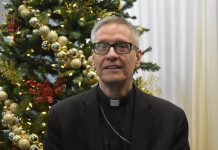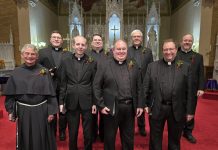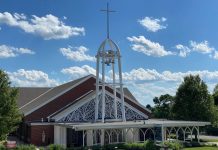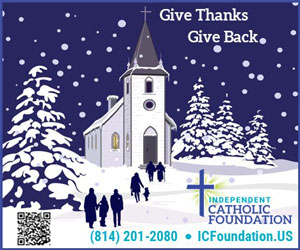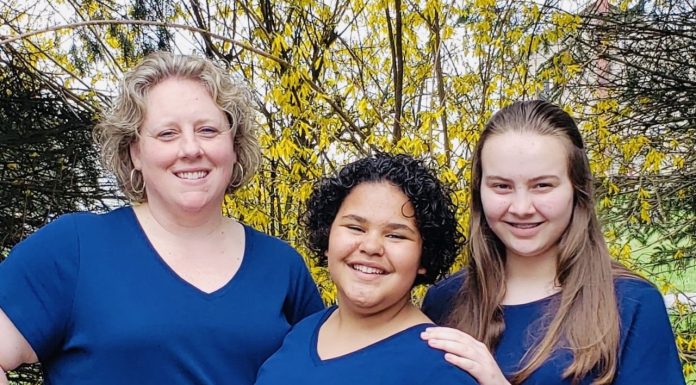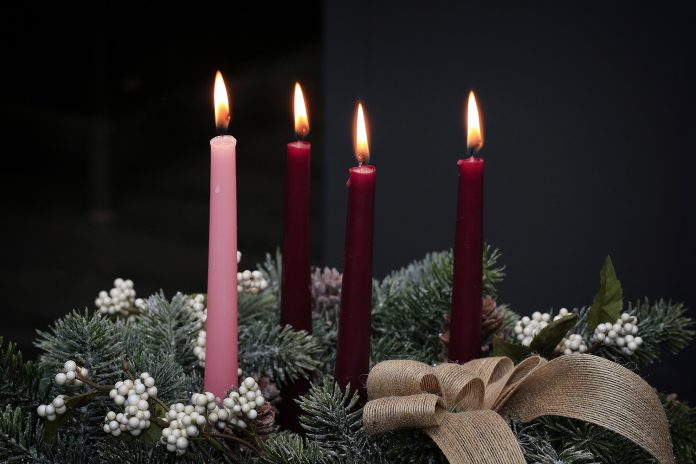
Reflection by Lindsey Weishar
“Hail, full of grace! The Lord is with you.” Never before have Gabriel’s words struck me as they have this year.
When Gabriel speaks these words to Mary, she responds with perplexity. The divine has broken into her world tremendously. The Lord is about to be with her in the most intimate way he has ever been with a human creature: within her womb.
To this invitation, Gabriel adds, “Do not be afraid, Mary.”
What was Mary doing the moment before her world changed completely? Was she baking bread, sweeping the room, praying? Nothing could have prepared her for this angel’s appearance and his message. That she, too, was afraid might comfort us. Despite what she could not yet grasp in this extraordinary encounter, Mary gave her yes to God’s will.
Mary’s yes is a yes to the Lord being not only with her, but with all of us.
This year our lives were turned upside down, seemingly overnight, by a pandemic that filled us with uncertainty and even fear. For many weeks we could not receive the Lord, who in the Eucharist physically comes to dwell within us. Our churches were closed, and we not only hungered for him, but also for the faces of friends and family and the daily activities of pre-pandemic life that threaded our lives with the lives of others.
But Gabriel’s words are a promise that even in the midst of trial the Lord is with us. In this year of unpredictability, he came to us through the love of our priests who livestreamed Mass for us and found ways to bring us the sacraments at safe distances.
He came in the kind words and actions of family, friends and strangers who brought us encouragement and comfort. He comes again as an infant to meet our vulnerability, a vulnerability we have perhaps felt more keenly this year.
Gabriel’s words also point us toward another reality: not only does the Lord come to us in the Eucharist, he is with us always. The word “with” indicates not only a walking alongside, but, as we hear in the Scriptures when someone is “with child,” a carrying within.
This Advent, I’ve been intent on peeling back the layers of fear that have accumulated over the past months, the anxieties threatening the small shoot of faith that still grows and whispers, “He is within you, too.”
This Advent, we may find greater resonance with Mary. As the Lord is with us, we are called to be with him, always birthing him into the lives of others. Birth, of course, involves labor. It involves risk.
In her poem “The Risk of Birth,” novelist Madeleine L’Engle reflects on how Christ vividly enters our hearts even in the most desolate of seasons: “When is the time for love to be born? / The inn is full on the planet earth, / And by a comet the sky is torn — / Yet Love still takes the risk of birth.”
This year, as I’m crawling out of those familiar corners of fear, I’m realizing being with him takes practice. I’m reminded of St. Augustine’s beautiful words: “For see, thou wast within and I was without, and I sought thee out there. Unlovely, I rushed heedlessly among the lovely things thou hast made. Thou wast with me, but I was not with thee.”
Sometimes, it is we who draw away from him. And yet he is there, at the door of our hearts, waiting to be admitted.
But how are we to be, as St. John Paul II says in one of his poems, “more with Him, / more with Him, not merely with oneself”? The answer is to imitate Christ, to imitate Mary — to make of ourselves a gift.
In her breathtaking book “The Reed of God,” Caryll Houselander shows us the way to become this gift: “There is only one cure for fear — trust in God. That is why the beginning of Christ’s being formed in us consists in echoing Our Lady’s fiat; it is a surrender, a handing over of everything to God.”
I often imagine this surrender as meeting God at a train station and letting him carry my too-heavy luggage. What burdens me does not burden him. His joy is found in simply being with me.
But the gift is mutual. As we give ourselves to God, he also gives himself to us. He places himself in our care not only in the moment of Mary’s fiat, but hundreds of years before, when David hears through the prophet Nathan “the Lord is with you” (2 Sm 7:3) and God promises David an everlasting kingdom.
And he is with us today, continuing to lighten and nourish our whole being. With him, we are able to say yes in ways never imagined, able to approach our brothers and sisters with a love deeper than our own, and able to hope, like Mary, that no matter the sorrows of life, the truth that he is with us will carry us through all storms.
In this Fourth Sunday of Advent, may we let him be with us, within us, more and more.
Lindsey Weishar is a poet and freelance writer from the Diocese of Peoria, Illinois.


